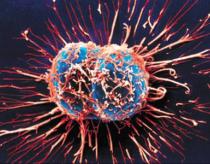Catch a 'fasting' tumor to kill cancer
A group of American and Belgian experts found that lactic acid is an important source of energy for cancer cells. Thanks to this finding, they found an extremely effective method to remove tumors: Do not allow them to absorb lactic acid.
Many tumors are capable of burning fuel in different ways to serve their activities. Cancer cells near blood vessels have abundant oxygen supply. They can burn glucose (like healthy cells) or lactic acid (lactate). Cancer cells located far away from the blood vessels that are not supplied with enough oxygen should be forced to burn a lot of glucose to survive. In that inefficient process, they release lactate.
Cancer cells with abundant oxygen supply tend to burn lactate. This reaction releases glucose for cells without oxygen. But when oxygen-free cells lose their ability to burn lactate, oxygen-hungry cells receive very little glucose.

A cancer cell is dividing.Photo: newscentre.bham.ac.uk.
"For oxygen-hungry cancer cells, glucose is life ," said Pierre Sonveaux, professor of pharmacology and therapy at the University of Louvain (Belgium).
The next step of the team is to find out how lactate invades cancer cells. Because muscles can recycle lactate to prevent shrinkage, the researchers believe that similar activity occurs in cancer cells.
'Muscle bundles have a protein for transporting. People call it MCT1. We found that MCT1 also exists in cancer cells , 'said Dr. Mark Dewhirst, professor of cancer pathology at Duke University (USA).
The team used chemicals that could block MCT1 to push them out of cancer cells to see what role MCT1 has in transporting lactate. The results showed that MCT1 is a means of transporting lactate to cancer cells.
Blocking MCT1 does not kill cancer cells with abundant oxygen supply, but makes them free of lactate to burn. They were forced to use the majority of glucose before this type of sugar reached the position of oxygen-hungry cells. Gradually oxygen-starved cells die from glucose deficiency.
'Destroying oxygen-hungry cancer cells by letting them starve is a whole new idea,' Mark said.
For more than 50 years, scientists have known that oxygen-hungry cancer cells are one of the reasons that prevent chemotherapy and radiation therapy, but no effective method has been found to destroy them. 'Oxygen-starving cancer cells help tumors to revive after chemotherapy and radiation therapy,' said Professor Olivier Feron, a member of the research team.
One of the advantages of 'starving' oxygen-deficient cancer cells is that people do not need to take drugs to the cells. Instead, scientists only need to produce a drug that blocks MCT1 and other proteins that function to transport lactate.
The team tested radiotherapy in combination with blocking MCT1 for cancerous mice. The results show that cancer cells disappear completely, including those near the blood vessels.
- Kill the tumor with triple antibodies
- Mapping the DNA of the tumor
- Brain cancer, symptoms and signs of identification
- Find out how to turn the tumor into a 'vaccine factory' that destroys cancer
- Creating cells to kill tumors
- Machinery will diagnose cancer in lieu of humans
- Successfully tested anti-cancer vaccines on animals
- Atrophy of the tumor in just one day
- Breakthroughs in cancer chemotherapy do not cause side effects
- Australian scientists have prevented dangerous skin cancer
- Discover the inner workings of cancer
- Scientists discovered the type of tumor suppressor gene
 Why do potatoes have eyes?
Why do potatoes have eyes? 'Tragedy' the world's largest carnivorous life: Death becomes ... public toilet
'Tragedy' the world's largest carnivorous life: Death becomes ... public toilet Tomatoes were once considered 'poisonous' for 200 years
Tomatoes were once considered 'poisonous' for 200 years Detecting microscopic parasites on human face
Detecting microscopic parasites on human face